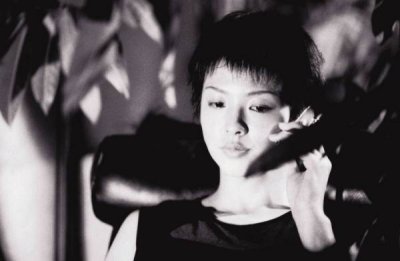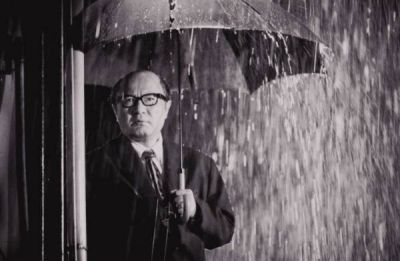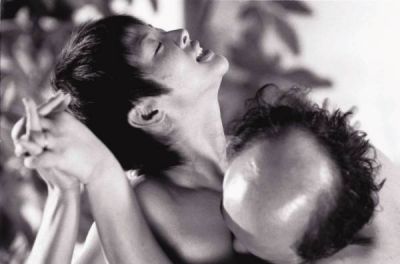A Snake Of June
Symbolism that causes embolisms. Weird, beautiful, bizarre, certainly not dull but perhaps too artsy for it's own good.

Where to start? This is one of the more bizarre outings to be seen in a mainstream cinema chain, and would give most arthouse cinemas a run for their money too. Anyone who has experienced director Shinya Tsukamoto's previous works deemed worthy of a western release Tetsuo : The Iron Man and Tetsuo II : Body Hammer will probably expect a full on onslaught of insanity from the start. They'll be a little surprised, as in A Snake Of June (or Rokugatsu no hebi) there's a semblance of a serious story for the first half of the movie.
Admittedly, it's a fairly odd story, but that's nothing to be ashamed of. Rinko Tatsumi (Asuka Kurosawa) works as a counselor for the Japanese equivalent of the Samaritans. She is married to an older businessman, Shigehiko (Yuji Kohtari). While Rinko is a more than adept counselor, she seems to have far greater trouble communicating her needs and feelings to her husband, and as a result there is a complete and total lack of intimacy in the relationship. Into this tale of slight domestic discomfort steps an unexpected blackmail situation. Rinko receives a letter containing photographs of her dolled up to the nines in a tarty miniskirt, in sharp contrast to the outwardly presented demure professional image that she is theoretically more comfortable with. Thing is, she looks a lot happier in her alternate costume than she normally does.
The blackmailer has threatened to expose her not particularly shocking, but nevertheless enough to cause a local scandal secret unless she follows his instructions given over the phone he has thoughtfully included. It quickly transpires that the blackmailer is a chap Rinko has previously helped in her day job, Iguchi (Shinya Tsukamoto himself). She helped find a new reason for him to live, unfortunately it appears to be stalking her with his high powered camera. He was fortunate enough to shoot her at the only time she had worn this miniskirt, and rather strangely he has taken it upon himself to put Rinko through a series of things that he's correctly guessed she wants to do.
He instructs her to walk through a crowded department store in her borderline indecent skirt, with the promise that he will return the negatives once this ordeal has finished. Rinko is mortified by her exposure, and protests over the phone about the stares she is bound to receive. As she follows Shinya's directions, taking her through the store and into a sex shop to purchase a vibrator, it becomes as clear to the audience as it has to Shinya that this is actually what Rinko wants too. The importance of this realisation cannot be overstated, as it's the only thing that turns this into an empowering experience for Rinko rather than an exploitative slice of soft pornography.

Make no mistake, it is clearly intended as an erotic film. The rainy cityscape, the humidity forming moisture droplets on exposed skin, the languid showers all are designed to show Rinko's sensual side that she is routinely denying herself in her marriage. Frankly, it?s beautiful. If all you want from a movie is a visual feast then this is prime viewing, with every shot an artwork with a lovely blue tint to it that isn't too evident in the screenshots.
If the first half of the film is comparatively sane things take a turn for the obscure in the second. Dealing with Shigehiko, who in his own way is suffering as much as Rinko. He has developed some obsessive/compulsive cleanliness disorder, typically seen scrubbing away at sinks and bathtubs. This isn't touched on more than a sign of the disfunctionality in their marriage, and anyhow things are about to dramatically change.
He grows suspicious of Rinko's occasional disappearing acts and takes to following her, incurring the attention of Iguchi. While Iguchi's plans for Rinko had were unconventional but at the same time feasible, his scheme for Shigehiko's awakening is bewildering, and more like the Tsukamoto we know and are befuddled by. Shigehiko is drugged, kidnapped, taken to a bizarre cult / sex club (ain't no party like a sex club party...sorry) full of besuited businessmen with metal funnels placed over their faces. They and a similarly funneled Shigehiko witness a forced sex / rape of a couple before the duo are placed in a chamber and apparently drowned.
Not long after an understandably puzzled Shigehiko is confronted by Iguchi, who proceeds to lay a beating on Shikehiko with steel toe capped boots before everything goes all Tetsuo and Iguchi starts strangling him with what I can only describe as a semi-sentient metallic mechanised penis extension. This kind of extreme imagery is common in the Tetsuo movies so I suppose the only surprise should be it's taken this long for it to appear, but it's in such sharp contrast to the more subtle methods used in the first half of the film that it's still a little jarring to see it here. It's a truly strange quarter hour that stands a fair chance of alienating a good chunk of the audience, even if it is shot with the same flair and panache as the rest of the film. While a reasonable proportion of frames from the earlier half wouldn't look out of place in a gallery of erotica, the second half belongs more to H.R. Geiger.

It's handled in a similar way to Cronenberg's works and to an extent Lynch's, if you haven't seen Tsukamoto's output before. I say this to give the uninitiated some idea what to expect, as Tsukamoto retains his own distinctive style, but if you've found the mentioned Western directors a little too oddball for your liking then there's little chance that this will sink your submarine. The symbolism is as potent as it is obvious, with Iguchi's rage at his cancer and presumably his feelings for Rinko spilling out into both a physical and a meta-physical form.
The films last gambit shows a now fairly close to death Iguchi meeting Rinko for a final and charged photography session, with an eavesdropping Shigehiko witnessing Rinko's newfound sexual freedom at the same time as discovering his own. This leads to the first and only scene of intimate physical contact between Rinko and Shigehiko, ending the film on an emotional and physical highpoint.
While the acting is pleasantly great throughout, with Kurosawa in particular deserving praise for her portrayal of a tortured soul and eventual liberation, the real star here is the cinematography. Every shot is meticulously planned and beautifully executed, although there are a few seemingly pointless 'arthouse' moments that I found to mar the film more than enhance it. In particular there is a strange obsession with slugs on leafs, which perhaps I'm being obtuse over but I can't tie it up with much of the rest of the symbolism.
While there's merit to back up the strangeness forced on us I'm not entirely sure whether I can definitively say I enjoyed it or not. My feelings for this film have even changed over the course of writing the review. Certainly at no point did I feel that I couldn't be bothered watching it, but on leaving the cinema I wasn't exactly ebullient with praise for it. This may perhaps have had something to do with watching the abjectly crappy Identity beforehand. After forcing myself to think about the strangeness on display over the course of the last thousand odd words I've come to appreciate the ideas behind it much more, but in the interests of advising people who aren't going to sit down and write about it I'll grade it as per my initial thoughts.
I should reinforce the caveats added throughout the review, this is a strange little film. It's perhaps it's littleness that saves it though, at 77 minutes the oddness isn't so sustained that it shuts down your higher brain functions in the same way Tetsuo II did. Seeing as I'm a fan on this type of weirdness and even I didn't initially warm to it, I'll have to give it an average mark although I think perhaps I'm selling it a little short.
Were I in the business of passing quantifiable judgements, I'd award this 3/5 TippyMarks.
Yuji Kohtari (Shigehiko)
Shinya Tsukamoto (Iguchi)